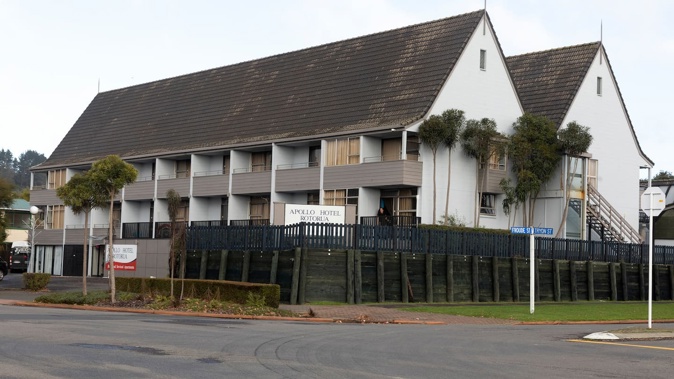
The Government has announced it will stop using two more Rotorua motels for contracted emergency housing early next year.
The Apollo Motelon Tyron St will stop being used by Auckland Anniversary weekend at the end of January and a second, yet-to-be-named motel, will close in March.
Once the two motels closed to contracted emergency housing, there will be five others left in Rotorua. Nine emergency housing and Covid response motels have closed since National came to power.
The Apollo Motel was among the seven motels for which the Ministry of Housing and Urban Development sought a 12-month resource consent extension to keep using until as late as the end of 2025.
The ministry indicated it would close motels in a staged approach through that year.
The Apollo Motel is one of the emergency housing motels near tourism attraction Whakarewarewa - The Living Māori Village.
Whakarewarewa general manager Dr Tanya Robinson’s submission on the resource consent detailed the tourism business’ experience operating near emergency housing, saying workers and visitors were often unsafe when arriving and leaving the village and its carpark was used for illegal activity including drug use, toileting, drug dealing and prostitution.
Robinson said staff had regularly been confronted by drug users or by people displaying inappropriate or threatening behaviour.
 Whakarewarewa - The Living Māori Village general manager Tanya Robinson. Photo / Laura Smith
Whakarewarewa - The Living Māori Village general manager Tanya Robinson. Photo / Laura Smith
Associate Housing Minister Tama Potaka said in a statement on Friday there had been a 30% reduction in the number of households in contracted emergency housing in Rotorua since National came into Government.
“Our focus is on ending contracted emergency housing in the Whakarewarewa area starting with the Apollo Hotel.”
He said another motel in Whakarewarewa intended to be exited by end of March. He would not yet name which motel it was.
“National promised real change for whānau and individuals stuck in emergency housing and we are on track to deliver, with all contracted emergency housing in Rotorua set to close within 12 months.”
Potaka said in his statement there were 135 households in contracted emergency housing at the end of October 2024. In November, 15 households left for social housing, four households left for transitional housing and three households left for private rentals.
Rotorua MP Todd McClay. Photo / Andrew Warner
Rotorua MP Todd McClay said it was another step towards ending the use of emergency housing motels in Rotorua.
“I campaigned on ending the use of our city’s motels for homelessness and restoring Rotorua’s reputation as a world-class tourist destination. This week’s announcement is another step in that direction.”
McClay said in the past year the Government had instructed government agencies to stop sending homeless people to Rotorua for emergency motels, given first priority to local people for Kāinga Ora houses as they became available, and shut down six contracted and one Covid-response homeless motel.
“Rotorua is a great place to live, work and play. We are working hard to back local people so they can be proud of their city,” McClay said.
A 2022 Ministry of Social Development sampling exercise revealed nearly a third of those in emergency housing were not from Rotorua.
The Government of the time denied housing clients were being encouraged to move to Rotorua, and said the main reason people relocated there was to be closer to whānau support. In December 2022 it agreed to progressively reduce emergency housing motels in Rotorua to “near zero as soon as possible”.
 Restore Rotorua chairman Trevor Newbrook. Photo / Andrew Warner
Restore Rotorua chairman Trevor Newbrook. Photo / Andrew Warner
Restore Rotorua chairman Trevor Newbrook said his lobby group had worked hard to reduce emergency housing motels in Rotorua and he was pleased the National Government was listening to their concerns.
He said politicians appeared to be sticking to election promises so far.
Newbrook said he believed once the process of stopping out-of-towners coming to Rotorua for emergency housing stopped, the problem got better, despite the prior Government’s denials.
“The feedback I am getting is that things are improving and when you go down Fenton St, and I walk down there often now, things are much better.”
Independent commissioner David Hill, who is tasked with deciding whether the seven motels would be allowed resource consent extensions, has deferred his decision until the New Year, a Rotorua Lakes Council spokesman said. Hill had originally intended to release his decision at the end of this year.
A ministry spokesman said the existing contracted emergency housing motels in Rotorua would keep operating under the terms of the existing consents pending Hill’s decision.
Kelly Makiha is a senior journalist who has reported for the Rotorua Daily Post for more than 25 years, covering mainly police, court, human interest and social issues.
Take your Radio, Podcasts and Music with you









